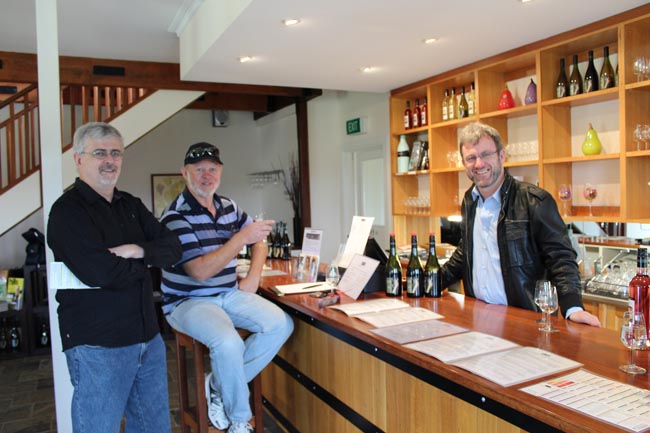Rick Morrell and I have connected a couple of our meetings in Adelaide with local food and wine tours. It’s part of our commitment to going the extra mile in our support of our colleague Craig Mitchell as we reflect on what we can learn from his research on Christian education in the Uniting Church in Australia. It’s also a way to build “sabbatical” time into our hectic calendars, providing time to unwind. Today we reflected on the connection between the wine makers we’ve visited and the many expressions of local faith formation found in the UCA. Read on for a few initial thoughts…

Each vineyard and winery has the opportunity to respond to a unique local environment, with local climates and soil types changing the performance of each grape variety. A shiraz from the Barossa is quite different to one from the Adelaide Hills, McLaren Vale, Hunter Valley and the Margaret River. In the same way local conditions shape the way faith formation happens around the country. Urban and rural settings are obvious factors. However I’ve also noticed that climate really does affect the values of a community and its approach to learning. People in colder climates, I’ve observed, are more likely to spend time reading than those in warm climates.
The art of making wine involves wisdom and creativity. Winemakers draw on inherited wisdom, picked up from family and colleagues, but also passed down over centuries from people in the industry. That wisdom is grown as people take risks and try out new varieties and techniques. Courage is required when facing what appear to be disastrous years. There is always something to learn. In the same way we see people around the country drawing on a tradition of faith formation that has centuries of theological exploration at its base, along with more recent learning about how learn.
Winemakers thrive when they share their insights and collaborate with others. Hahndorf Hill Winery in the Adelaide Hills, for example, recently imported three clones of the Gruner Veltliner grape variety from Austria. Their wines sell out in days. They now are working with neighbouring vineyards to develop a regional specialty that will attract visitors in the future. People involved in local faith formation know that they will be more effective when they learn from others, and share their insights with others. Resources released to others are able to grow in their effectiveness. People working in local situations need be aware of and connect with people working in similar contexts.
Winemakers aspire to excellence, spurred on by the evaluation and affirmation of others in their industry. The Uniting Church has shied away from competitiveness, for good reasons. We’re suspicious of “empire building” and ego driven approaches to anything. However we still need to have the capacity to recognise the helpful work done by others.
Finally, we need to learn about long term planning and strategic choices. Wise winemakers know that choices around the planting of grapevines have long term implications. Do they go for volume or quality? Do they work with an organic approach or use pesticides and insecticides? In the same way, people involved in faith formation know they have to plan for long term capacity building of people who are able to invest in others.
What do you think? What parallels would you draw?

Really enjoyed reading this, Duncan, especially your analogy between the way winemakers work and how faith develops in a community. Nice stuff!
Great metaphor for being incarnational and truly adaptive in local context. Fascinating challenge to be so deeply enriched by traditions and wisdom of the past and at the same time be on the cutting edge of technologies and new insights.